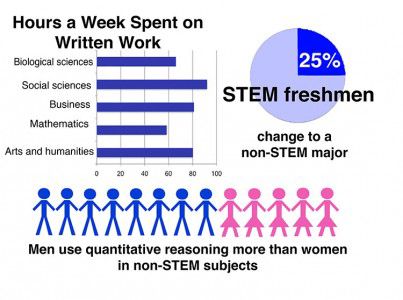
ability to process quantitative research and engage in educational practices.
GRAPHIC BY MAYA DEVERAUX/DAILY FREE PRESS STAFF
Despite a recent report that most college students do not actively use quantitative reasoning skills, many Boston University students said these skills are still valuable for professional and academic careers.
Jeremy Kramer, a College of Engineering junior, said it is useful for college students to employ such abilities regardless of their majors.
“They [quantitative reasoning skills] help you survive,” Kramer said. “We are a tool-based society, and to be able to reason quantitatively is to be able to interact with our edifices.”
The 2013 National Survey of Student Engagement, released Thursday, found that employers look for quantitative reasoning skills in applicants, regardless of the positions they are trying to fill.
“Quantitative literacy – the ability to use and understand quantitative information – is increasingly important for effective democratic participation,” the report stated.
Quantitative reasoning skills include the ability to interpret data, to draw conclusions based upon numerical evidence and to communicate such information to others effectively.
However, many students are not gaining crucial experience working with quantitative information, according to the report. 34 percent of first-year students surveyed said they “often” reached conclusions based on their own analysis of numerical information, and 26 percent said they have used numerical information to examine a real-world dproblem or issue.
The amount of schoolwork students in each field of study complete is indicative of their lack of quantitative reasoning skills, according to the study. Students in biological sciences, agriculture and natural resources have fewer assigned hours of writing work per week, as compared to students majoring in subjects such as arts and humanities, social sciences and communication.
Students in science, technology, engineering and math fields use quantitative reasoning skills more often than other students, and men are more likely to employ such skills more often than women, the report stated.
However, about 25 percent of freshmen STEM students changed their field of study by the end of their first year, according to the study.
Kramer, who studies electrical engineering, said students must attempt to understand data, even though quantitative information can be frustrating for students to digest.
“A lot of times, I’d like to just see what the conclusion was from the data analysis,” Kramer said. “… In one way it’s valuable to analyze the data, and yet for a learner … the actual statistics that go into creating these relationships are not necessary to understanding the relationship.”
Elan Plotkin, a School of Management freshman, said he works with quantitative data on a daily basis.
“It’s definitely important to keep your brain active,” he said. “To be able to see different correlations and different patterns, it’s really good for you … I recommend everyone to work on their quantitative reasoning skills.”
Plotkin also said quantitative reasoning is central to finance, his intended major and career path.
“In terms of seeing future stock prices and where to invest … it’s definitely all about quantitative reasoning,” he said. “… It’s a great everyday skill and it applies to everyone’s lives.”
Mathew Larkey, a College of Arts and Sciences junior, said he uses quantitative reasoning skills to explain his findings to people who are unfamiliar with his research.
“It [the data] looks like a complicated graph, and there are all these numbers and all these different variables, and it’s hard to take [anything] away from it,” Larkey said. “But, from what I’ve learned here, I know how to break it down into smaller pieces so that people can understand it, people who aren’t science majors or just aren’t familiar with statistics.”
Larkey said quantitative reasoning is a major component of the research he conducts at the BU Medical Campus.
“When I came here, I had no idea [how to use] statistics and graphs,” Larkey said. “… A lot of people in my lab are still not statistics masters. They refer to statistics as ‘wizardry’ … [and] they usually leave it for the statisticians if need be, but I think it’s super important.”



















































































































